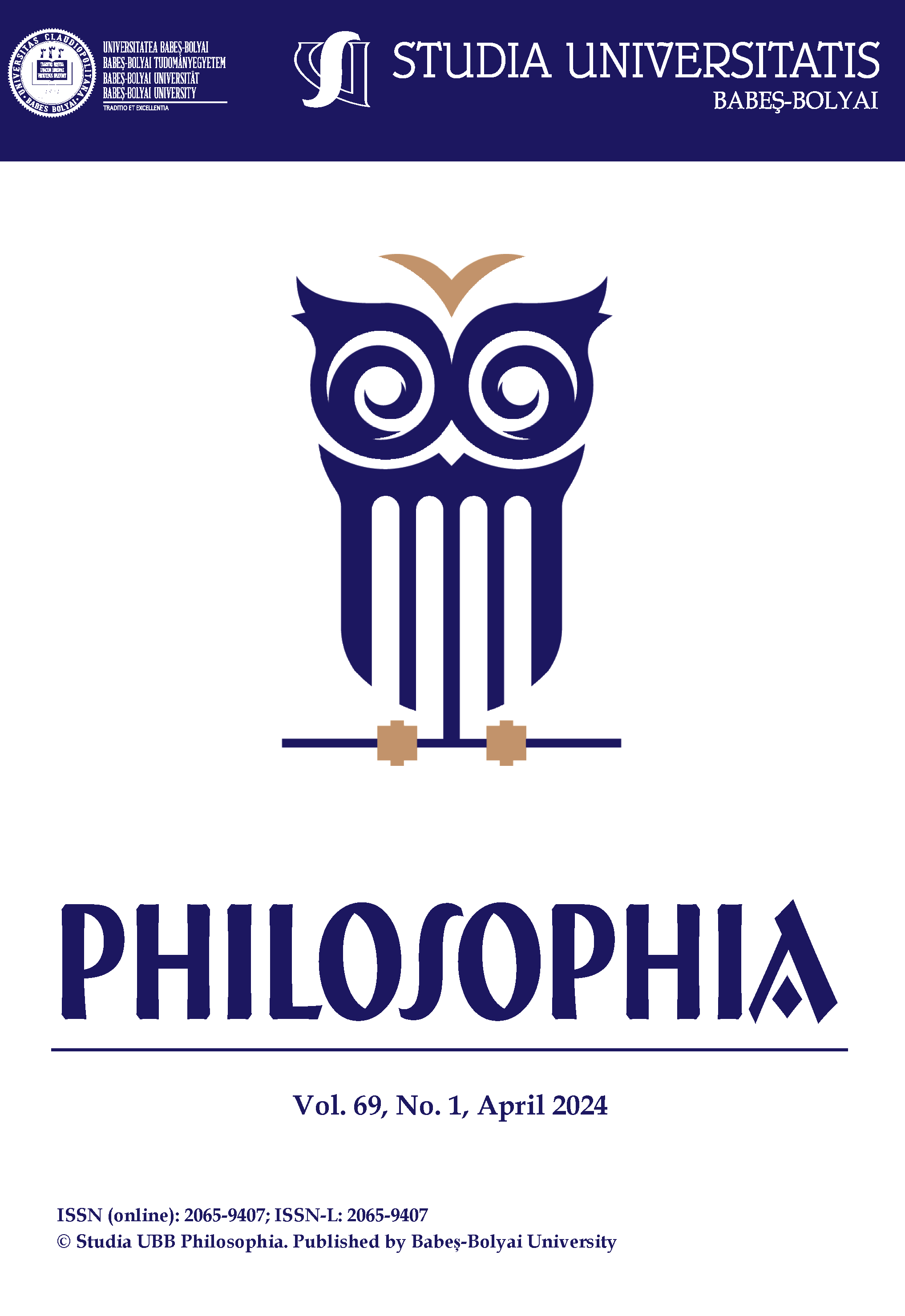Helmuth Plessner’s Philosophy of the Work of Art in Anthropological and Phenomenological Perspective
DOI:
https://doi.org/10.24193/subbphil.2024.1.05Keywords:
philosophical anthropology, phenomenology, Helmuth Plessner, Edmund Husserl, Max Beckmann, corporeality, Umwelt, resonance, new form.Abstract
This paper aims to explore the theme of art in Helmuth Plessner’s philosophical anthropology and show the possibilities of its use in the analysis of artistic creation and artwork. The article is divided into three parts: in the first part, it presents the background of Plessner’s anthropological project and the intersection of his philosophy with Edmund Husserl’s phenomenology. This strategy enables the synergy of both approaches which can be used for reflection of art. The second part displays the scope and ingenuity of Plessner’s approach through a selection of texts where he addresses art. And finally, the third part delves into a functional elaboration of the anthropology of an artwork, specifically, using Max Beckmann as an example, into the question of anthropological foundations in art making, and the question of new form in art. For the latter question, I use the approach to architecture as an example relying on corporeality and Umwelt as guiding concepts. This analysis provides, on the one hand, description of anthropologically significant phenomena of artistic production of the first half of the twentieth century, and on the other hand, reveals functional determinations of corporeality, the world, and resonance with the world, the so-called equilibrium, which can be used to understand the artwork, and artistic production in the creation of a new form in art.References
Apostolescu, Iulian, Serban, Claudia (eds.), Husserl, Kant and Transcendental Phenomenology, Berlin, Boston: De Gruyter, 2020.
Bernhard, Peter, “Plessners Konzept der offenen Form im Kontext der Avantgarde der 1920er Jahre,” in Arhe, 4(7), 2007, pp. 237-252.
Biemel, Marly, “Einleitung des Herausgebers,” in Husserl, Edmund, Ideen zu einer reinen Phänomenologie und phänomenologischen Philosophie. Zweites Buch, The Hague: Martin Nijhoff, 1952, pp. viii-xx.
Breyer, Thiemo, “Helmuth Plessner und die Phänomenologie der Intersubjektivität,” in Bulletin d’Analyse Phénoménologique, 8(4), 2012.
Čepan, Oskár, Oskár Čepan and visual art, Bratislava, 2018.
Dietze, Carola, Nachgeholters Leben. Helmuth Plessner 1892-1985, Göttingen: Wallstein Verlag, 2006.
Fischer, Joachim, “‘Ästhetische Anthropologie’ und ‘anthropologische Ästhetik’”. Zur Philosophischen Anthropologie der modernen bildenden Kunst,” in Internationales Jahrbuch für philosophische Anthropologie, De Gruyter, 2020. DOI: 10.1515/jbpa-2019-0005
Fuchs, Thomas, The Phenomenology and Biology of the Embodied Mind, Oxford University Press, 2018.
Gallagher, Shaun, “Surprise! Why inactivism and predictive processing are parting ways: The case of improvisation,” in Possibility Studies & Society, 1(3), 2023. DOI: 10.1177/2753869922113269
Heinämaa, Sara, “On the transcendental undercurrents of phenomenology: the case of the living body,” in Continental Philosophy Review, 54, 2021, pp. 237-257. DOI: 10.1007/s11007-021-09534-z
Husserl, Edmund, Ideen zu einer reinen Phänomenologie und phänomenologischen Philosophie. Zweites Buch, The Hague: Martin Nijhoff, 1952. (Hua IV)
–, Aufsätze und Vorträge. 1922-1937, ed. by T. Nenon, H. R. Sepp, The Hague, Netherlands: Kluwer Academic Publishers, 1988. (Hua XXVII)
–, Zur Phänomenologie der Intersubjektivität. Texte aus dem Nachlass. Dritter Teil, 1929-1935, ed. by I. Kern, The Hague, Netherlands: Martinus Nijhoff, 1973. (Hua XV)
Lipták, Michal, “Body, Music and Electronics: Pierre Schaeffer and Phenomenology of Music,” in Studia UBB. Philosophia, 67(1), 2022, pp. 45-74.
–, “Husserl and the Radical Individuality of the Aesthetic Object,” in Husserl studies, 2023, pp. 1-22. DOI: 10.1007/s10743-023-09340-w
Mikš, František, Braque, Beckmann, Kokoschka, Balthus, Brno: Barrister and Principal, 2013.
Mugerauer, Robert, “Bi-Directional Boundaries. Eccentric Life and Its Environments,” in Plessner’s Philosophical Anthropology. Perspectives and Prospects, ed. by J. de Mul, Amsterdam University Press, 2017, pp. 212-228.
Plessner, Helmuth, Limits of community: A Critique of Social Radicalism, New York: Humanities Press, 1999.
–, “Zur Geschichtsphilosophie der bildenden Kunst seit Renaissance und Reformation,” in Ausdruck und menschliche Natur, Gesammelte Schriften VII, Frankfurt am Main: Suhrkamp, 2003, pp. 7-49.
–, “Über die gesellschaftlichen Bedingungen der modernen Malerei,” in Schriften zur Soziologie ind Sozialphilosophie, Gesammelte Schriften X, 2nd ed., Frankfurt am Main: Suhrkamp, 2006, pp. 65-284.
–, “Rebirth of Form in the Technical Age,” in Art in Translation, 3(1), 2016, pp. 37-51. DOI: 10.2752/175613111X12877376766149
–, “Homo absconditus,” in Condition Humana, Gesammelte Schriften VIII, 3rd ed., Frankfurt am Main: Suhrkamp Verlag, 2017, pp. 353-366.
–, “Die Frage nach der Conditio humana,” in Condition Humana, Gesammelte Schriften VIII. 3rd ed., Frankfurt am Main: Suhrkamp Verlag, 2017, pp. 136-217.
–, “Immer noch Philosophische Anthropologie?” in Condition Humana, Gesammelte Schriften VIII, 3rd ed., Frankfurt am Main: Suhrkamp Verlag, 2017c, pp. 235-246.
–, Levels of Organic Life and the Human, New York: Fordham University Press, 2019.
Pols, Kirsten, “Strangely Familiar. The Debate on Multiculturalism and Plessner’s Philosophical Anthropology,” in J. de Mul (ed.), Plessner’s Philosophical Anthropology. Perspectives and Prospects, Amsterdam University Press, 2014, pp. 261-274.
Vydrová, Jaroslava, “The Intertwining of Phenomenology and Philosophical Anthropology: From Husserl to Plessner,” in P. Šajda (ed.), Modern and Postmodern Crises of Symbolic Structures, Leiden, Boston: Brill, 2021, pp. 41-62.
DOI: 10.1163/9789004440968_005
–, “Man as a Being of Hygiene in a Phenomenological and Anthropological Perspective,” in Phainomena, 32(124-125), 2023, pp. 139-167. DOI: 10.32022/PHI32.2023.124-125.6
Wehrle, Maren, “Medium und Grenze: Der Leib als Kategorie der Intersubjektivität. Phänomenologie und Anthropologie im Dialog,” in Th. Breyer (ed.): Grenzen der Empathie. Philosophische, psychologische und anthropologische Perspektiven, Paderborn: Wilhelm Fink Verlag, 2013, pp. 217-238.
Wulf, Christoph, “The Creation of Body Knowledge in Mimetic Processes,” in G. Etzelmüller, Ch. Tewes (eds.), Embodiment in Evolution and Culture, Tübingen: Mohr Siebeck, 2016, pp. 250-264.
Zahavi, Dan, “Phänomenologie und transzendentalphilosophie,” in Heidegger und Husserl. Neue Perspektiven, ed. by G. Figal
Downloads
Published
How to Cite
Issue
Section
License
Copyright (c) 2024 Studia Universitatis Babeș-Bolyai Philosophia

This work is licensed under a Creative Commons Attribution-NonCommercial-NoDerivatives 4.0 International License.





